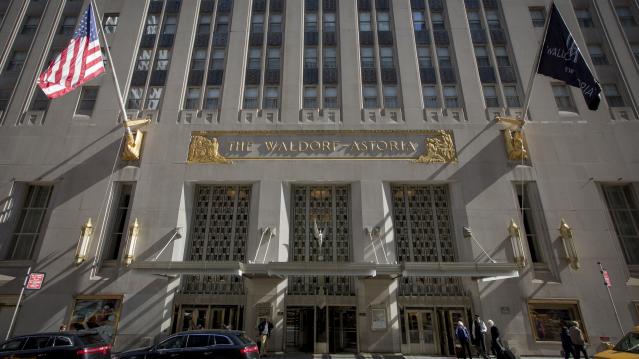The Waldorf’s Presidential Suite Isn’t Very Presidential Anymore

Months after the Waldorf Astoria was sold to a Chinese company, the State Department is abandoning a decades-long tradition of putting up U.S. diplomats at the storied hotel on New York’s Park Avenue.
This fall President Obama and state department officials will not be staying at the Waldorf for the opening of the U.N. General Assembly and will check into the New York Palace Hotel instead.
According to the New York Post, “every U.S. president since Herbert Hoover” has stayed in the presidential suite at the Waldorf when visiting New York, including President Obama. Presidential artifacts in the suite include President Jimmy Carter’s eagle desk set, one of President John F. Kennedy’s rocking chairs, a gold oval mirror from Ronald Reagan, and the personal desk of General Douglas MacArthur. The hotel is the site of Chinese history as well. On his first historic trip to the U.S. in 1974, Chinese leader Deng Xiaoping stayed at the Waldorf and attended a banquet given in his honor by then Secretary of State Henry Kissinger.
Related: U.S. Reviews Waldorf Astoria Sale to Chinese Firm
The $1.95 billion sale of the 47-story tower to the Beijing-based Anbang Insurance Group first raised eyebrows in Washington last October. Even though the previous owner, Hilton Worldwide Holdings, will continue to manage the hotel for the next 100 years, news of a “major renovation” sparked fears of possible Chinese cyber-espionage and surveillance.
Those fears were further heightened earlier this month when U.S. officials blamed Chinese hackers for a massive cyberattack targeting the U.S. Office of Personnel Management, exposing sensitive information about 4 million current and former federal workers. China has denied any involvement.
Map of the Day: Navigating the IRS

The Taxpayer Advocate Service – an independent organization within the IRS whose roughly 1,800 employees both assist taxpayers in resolving problems with the tax collection agency and recommend changes aimed at improving the system – released a “subway map” that shows the “the stages of a taxpayer’s journey.” The colorful diagram includes the steps a typical taxpayer takes to prepare and file their tax forms, as well as the many “stations” a tax return can pass through, including processing, audits, appeals and litigation. Not surprisingly, the map is quite complicated. Click here to review a larger version on the taxpayer advocate’s site.
A Surprise Government Spending Slowdown

Economists expected federal spending to boost growth in 2019, but some of the fiscal stimulus provided by the 2018 budget deal has failed to show up this year, according to Kate Davidson of The Wall Street Journal.
Defense spending has come in as expected, but nondefense spending has lagged, and it’s unlikely to catch up to projections even if it accelerates in the coming months. Lower spending on disaster relief, the government shutdown earlier this year, and federal agencies spending less than they have been given by Congress all appear to be playing a role in the spending slowdown, Davidson said.
Number of the Day: $203,500

The Wall Street Journal’s Catherine Lucey reports that acting White House Chief of Staff Mick Mulvaney is making a bit more than his predecessors: “The latest annual report to Congress on White House personnel shows that President Trump’s third chief of staff is getting an annual salary of $203,500, compared with Reince Priebus and John Kelly, each of whom earned $179,700.” The difference is the result of Mulvaney still technically occupying the role of director of the White House Office of Management and Budget, where his salary level is set by law.
The White House told the Journal that if Mulvaney is made permanent chief of staff his salary would be adjusted to the current salary for an assistant to the president, $183,000.
The Census Affects Nearly $1 Trillion in Spending

The 2020 census faces possible delay as the Supreme Court sorts out the legality of a controversial citizenship question added by the Trump administration. Tracy Gordon of the Tax Policy Center notes that in addition to the basic issue of political representation, the decennial population count affects roughly $900 billion in federal spending, ranging from Medicaid assistance funds to Section 8 housing vouchers. Here’s a look at the top 10 programs affected by the census:
Chart of the Day: Offshore Profits Continue to Rise

Brad Setser, a former U.S. Treasury economist now with the Council on Foreign Relations, added another detail to his assessment of the foreign provisions of the Tax Cuts and Jobs Act: “A bit more evidence that Trump's tax reform didn't change incentives to offshore profits: the enormous profits that U.S. firms report in low tax jurisdictions continues to rise,” Setser wrote. “In fact, there was a bit of a jump up over the course of 2018.”




